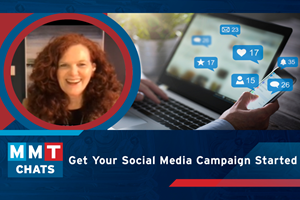Reference Selling
One of the best methods for finding new customers is having your existing happy customers lead you to new ones. This column will talk about reference selling, what it means and how to do it.
Share
As a consumer, what motivates you to buy a certain product or choose a specific brand? Do you only buy the things you need or do you also buy things you want but don’t need? Do you always buy the cheapest or do you sometimes pay more when there is a lower cost alternative?
It’s very interesting to think about our own behaviors as consumers in order to understand the mindset, motivations and patterns of the buyers of your manufacturing services.
Let’s say you wanted to buy a new machining center. Do you base at least part of your decision on the advertisements and editorial coverage touting a particular brand as the best choice for you? Probably. Does a promotion offering no money down and no payment for a year get your attention? Perhaps. Do you to talk to others that you trust and listen to the “word on the street” as well as surf the Web to find out what others that already own the machines are saying about their experience with them? Of course you do.
It is the experience of others that has the greatest impact on the brands we choose and chances are that we are willing to pay more because of the references. Perhaps it is because positive references reassure us that we are making a safe choice. And we are willing to pay a little extra for that perceived insurance policy versus choosing a lower priced machine with the exact same specifications. We are creatures that tend to follow the herd mentality and we believe there is safety in numbers.
I see this exact phenomenon manifested on MFG.com for manufacturing services. MFG.com has a rating system that enables buyers and suppliers that do business together to actually rate each other and talk about their experiences doing business together. Suppliers who have great references from buyers consistently win business at a higher rate and can get a premium for their services. Buyers are willing to pay more to buy from suppliers that the community has said are good and reputable.
While it is easiest to see and analyze the effects of positive references in an online environment where there is real transactional data, the same is happening in the offline world. Cultivating and managing references online and offline is important to your business and will help sway a buyer’s decision when he is trying to decide whether to give an order to you or a competitor.
Your existing and former customers are probably very willing to give you references if you just ask and tell them what you need. Ask them to send you a letter or e-mail talking about how you have helped them and what they think you do better than their other suppliers. Ask them if you can have potential new customers contact them for a reference on your business. Don’t be shy to ask for the references, it will make them feel proud that you respect them enough to use them as a reference.
Once you have the references and testimonials lined up, use them. Make sure you put testimonials from your customers on your Web site and on any printed materials such as brochures. Buyers will be swayed much more by testimonials from your customers than they will from pictures or a listing of your machines. They care about what you can do with those machines and the experience of working with you much more than the type or brands of machines you have. Let’s face it, your competitors all have basically the same machines, it’s the experience of working with you that becomes the differentiator and no one can tell that story better than your customers.
Also, whenever you send a quotation to a new customer you should include a few examples of references you can provide. Be careful not to give too much information at this point, but list a few companies that you are willing to provide as references upon request. Just the fact that you are willing to provide references will help make buyers feel safer in awarding a job to you and differentiate your quote from the others. It is a very competitive environment for shops and references, and testimonials are but one way you can stand out from the pack.
Related Content
MMT Chats: Simple Steps to Get Your Social Media Campaign Started
MoldMaking Technology Editorial Director Christina Fuges catches up with Gail Now’s Chief Curiosity Officer Gail Robertson. We talk about the importance of using the curiosity tool to tell your stories as part of a marketing strategy that includes social media. This episode is brought to you by ISCAR with New Ideas for Machining Intelligently.
Read MoreEditorial Guidelines: Editorial Advisory Board
The Editorial Advisory Board of MoldMaking Technology is made up of authorities with expertise within their respective business, industry, technology and profession. Their role is to advise on timely issues, trends, advances in the field, offer editorial thought and direction, review and comment on specific articles and generally act as a sounding board and a conscience for the publication.
Read MoreThe Role of Social Media in Manufacturing
Charles Daniels CFO of Wepco Plastics shares insights on the role of social media in manufacturing, how to improve the “business” side of a small mold shop and continually developing culture.
Read MoreMMT Chats: Mold Builder Shares “Raw and Real” Social Media Strategy
MoldMaking Technology Editorial Director Christina Fuges sits down with Murphy Forsyth, GM – Injection Molding and Director Of Marketing for Zero Tolerance LLC in Clinton Township, MI.
Read More






.jpg;maxWidth=300;quality=90)






